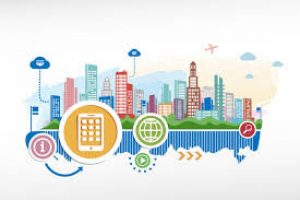
The term “smart city“ was coined towards the end of the 20th century. It is rooted in the implementation of user-friendly information and communication
technologies developed by major industries for urban spaces. Its meaning has since been expanded to relate to the future of cities and their development.
Smart cities are forward-looking, progressive and resource-efficient while providing at the same time a high quality of life. They promote social and technological innovations and link existing infrastructures. They incorporate new energy, traffic, and transport concepts that go easy on the environment. Their focus is on new forms of governance and public participation. Intelligent decisions need to be taken at the strategic level if cities want to
become smart. It takes more than individual projects but careful decisions on long-term implementations. Considering cities as entire systems can help
them achieve their ultimate goal of becoming smart. Smart cities forcefully tackle the current global challenges, such as climate change and scarcity of resources. Their claim is also to secure their economic competitiveness and quality of life for urban populations continuously on the rise.
All is Smart- All is Well?
Concepts and ways towards becoming a smart city are as diverse as cities themselves. Some approaches are technology-oriented, while others, such as
the Vienna Way, have put the social aspect in the fore. Measures cover the full range in between but they all have in common their aim to continuously add
substance to the concept of smart cities. New technologies must be assessed as to their benefit for the public interest and the preservation of creative freedom in public spaces. Smart ideas, to be implemented, require active public participation. Skills must be acquired to handle the new tools with care, especially with regards to data management and data security. Ultimately synergies must be developed across systems so that objectives and solutions can be found for smart cities to become forward-looking, use resources with caution and provide an environment worth living in for everyone.
Smart Urban Development
The first step towards becoming a smart city is taken at the strategic level. Main fields of action in this context are energy, mobility, the environment, the
economy, society, politics, administration, and quality of life. Some of the above are intertwined and increasingly networked with the support of IT. Technical, economic and social innovations provide the foundation for such activities. Smart cities build on sustainability but also on resilience in the sense that cities as systems are made more resistant and adaptable to influences from inside and out.